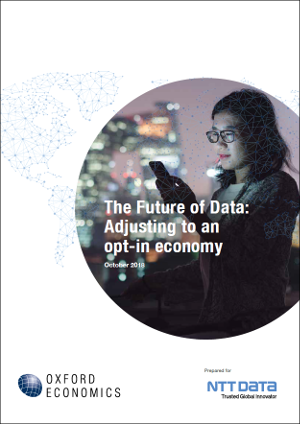Ungated Post | 09 Oct 2018
The Future of Data

2018 will be remembered as a landmark year in the history of the data economy, marked by a dramatic increase in consumer awareness of the power, scope, and risks of corporate data strategies, and by sweeping changes to the regulatory environment.
Oxford Economics worked with NTT DATA during the spring of 2018 to survey 500 executives and 5,000 consumers in 15 countries about their visions for a future shaped by data. We also conducted in-depth interviews with more than a dozen senior executives, officials, and academics. Our report presents our findings about this pivotal moment in the development of the data economy.
Our economic consulting team are world leaders in quantitative economic analysis, working with clients around the globe and across sectors to build models, forecast markets and evaluate interventions using state-of-the art techniques. Lead consultants on this project were:
Oxford Economics’ team is expert at applying advanced economic tools that provide valuable insights into today’s most pressing business, financial, and policy issues.
To find out more about our capabilities, contact:
EMEA
Paul Donnelly
+44 (0)207 803 1416
Email
Americas
Diantha Redd
+1 (646) 384 0271
Email
Asia
Peter Suomi
+65 6829 7198
Email
Related Services

Post
The economic impact of abandoning the WTO
Oxford Economics have been commissioned by the International Chamber of Commerce (ICC) to provide an independent assessment of the economic impact of WTO dissolution. This report details our findings and the assumptions underpinning our analysis.
Find Out More
Post
The economic impact of the sports activities of public service media
This study shows how the sports activities of public service media supported €4.5 billion of GDP and 57,000 jobs across 31 European countries in 2022, taking direct, indirect (supply chain), and induced (wage-funded expenditure) impacts into account. The report also highlights wider economic benefits of public service media sports coverage, such as the way in which it leverages sponsorship income for sports bodies.
Find Out More
Post
Global Trade Education: The role of private philanthropy
Global trade can amplify economic development and poverty alleviation. Capable leaders are required to put in place enabling conditions for trade, but currently these skills are underprovided in developing countries. For philanthropists, investing in trade leadership talent through graduate-level scholarships is an opportunity to make meaningful contributions that can multiply and sustain global economic development.
Find Out More